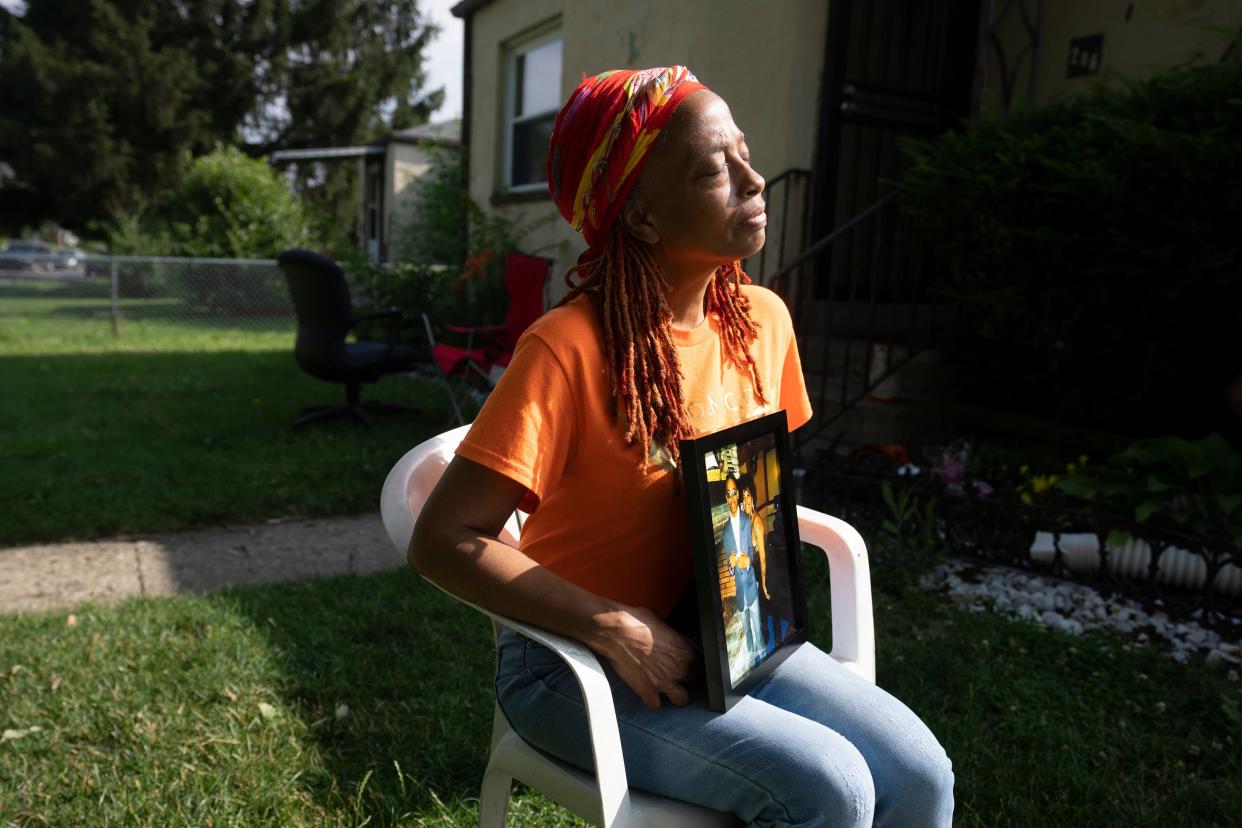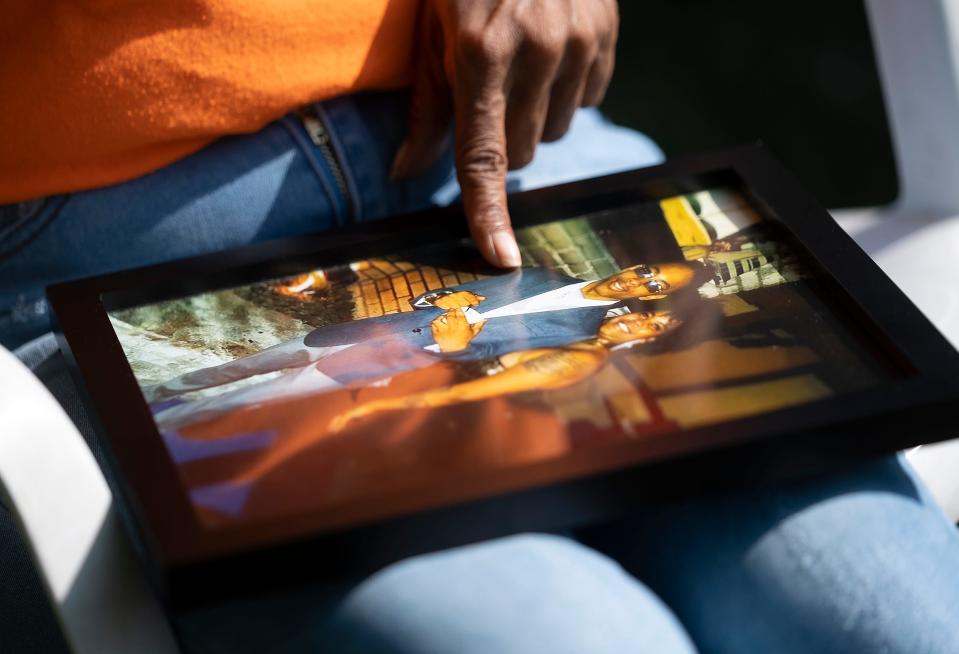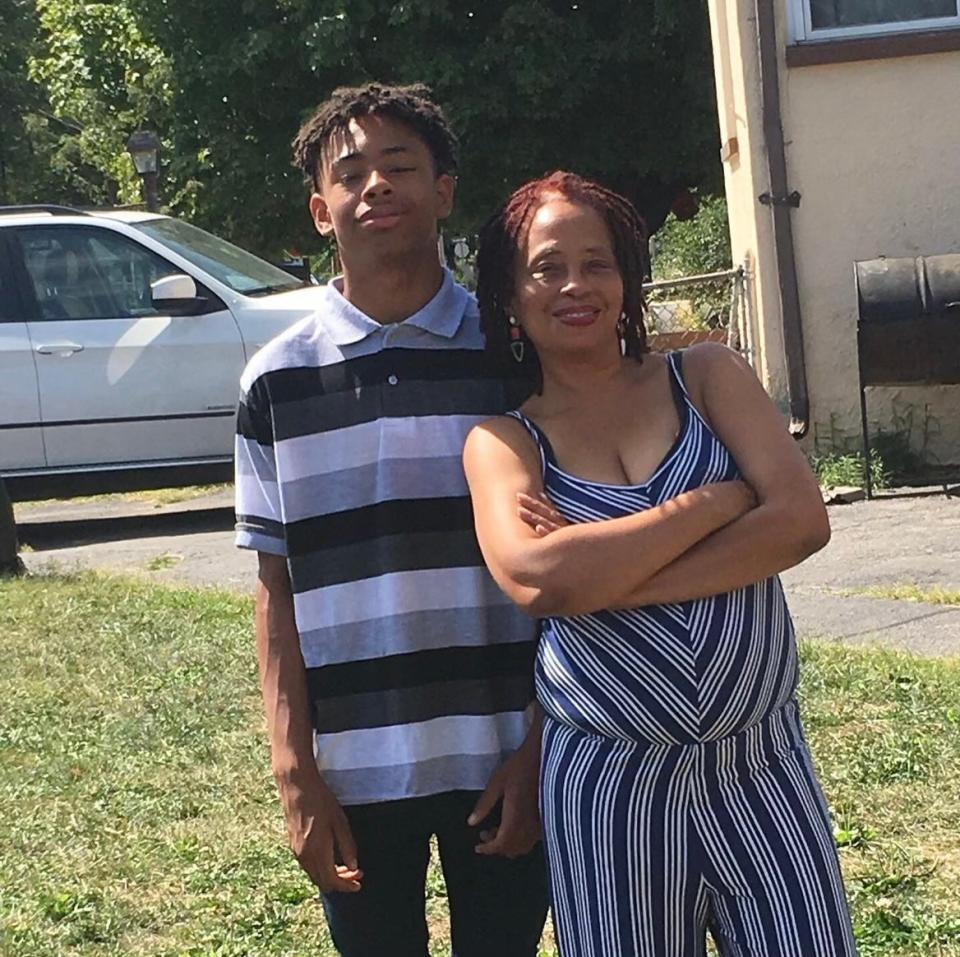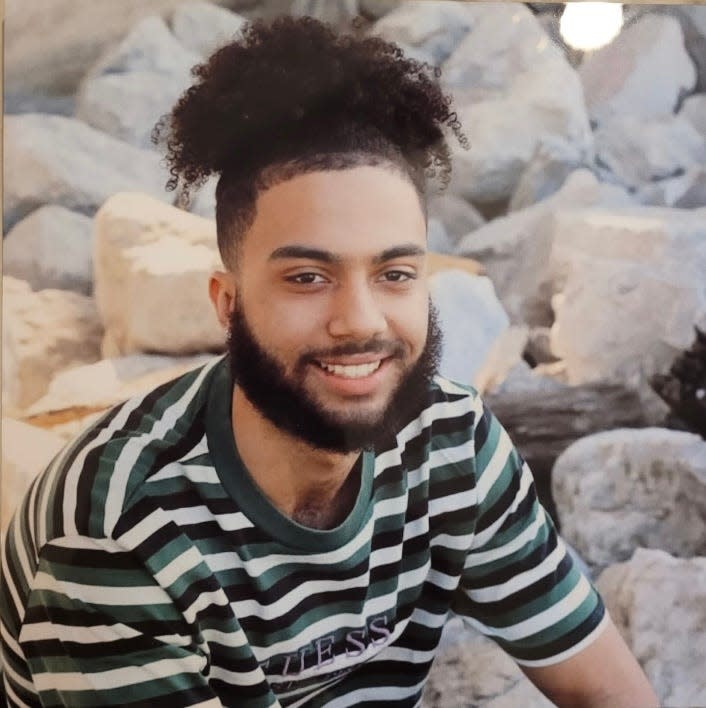‘I hate the Fourth of July now.’ Mothers with PTSD say fireworks elicit panic attacks

The sound of a car backfiring, an encyclopedia book dropping to the floor, or a car door slamming too hard make Columbus resident LaTonya Nichols think of her daughter.
“I can’t breathe, it’s like I’m looking for my daughter or somebody to be laying down … a complete flashback,” Nichols, 53, said.
Last summer, Nichols witnessed the fatal shooting of her eldest daughter, A’Tayia Nichols, 24, while she was trying to stop a fight that was escalating at Glenwood Park on the West Side. A few months after her daughter’s death, Nichols was diagnosed with post-traumatic stress disordeer (PTSD) — a condition commonly associated with veterans experiencing trauma from active combat.

With the rates of gun violence among kids and teens climbing alarmingly fast in the Columbus area, more and more people like Nichols are grieving their children and experiencing distress that can progress into PTSD.
“I can’t go to Glenwood, I can’t hear loud noises, I’ll see my daughter,” said Nichols, who lives in the city's Hilltop neighborhood.
Two years prior, in October 2020, Nichols’ 15-year-old son, Nofeir Cannon, was shot and killed near the Linden area.
Shortly after her son's death, Nichols quit her office job in the interest of working somewhere that would keep her busy at night and her mind occupied. She started working the loading dock at Amazon.
“I hate to hear the doors slam on a semi (truck) … it makes me ...” Nichols began, before being interrupted by a loud bang in the background.

“Oh, Jesus!” Nichols exclaimed. “See? Prime example. I dropped a broom.”
She let out a shaky laugh before taking a few moments to let her breathing recover.
‘I feel trapped’ — How firework displays induce anxiety
Each year, when the Fourth of July rolls around, Nichols avoids festivities at all costs. The sounds of booming fireworks are too much for her to bear, she said. She spent part of a prior holiday hiding under her bed, taking shelter from fireworks being set off from behind her house.
Vigil for gun violence victims: Columbus leaders, activists rail against state laws at vigil for gun violence victims
This year, she said, “I already know I either have to take some sleeping pills to go to bed early, or I need to get out of the city.”
Meshell Blair, a 50-year-old mother living in the Linden area, also experiences PTSD after her 19-year-old son, Cameron Kates, was fatally shot in March 2021. She, too, has dreaded the Fourth of July holiday ever since.
“I just can’t sit through a fireworks display. ... I start crying, I start shaking, I feel trapped,” Blair said. “I avoid it. I hate the Fourth of July now, and my son loved that holiday.”

With the purchase and ignition of consumer-grade fireworks now largely available to any Ohio resident, mothers like Blair and Nichols — both members of the nonprofit Mothers of Murdered Columbus Children — are bracing for the sounds of fireworks at any time anywhere, all through the weekend.
But, Blair said, sometimes all they can do is sit on their floor, imagine gunfire through their house and wait it out as the red, white and blue explosions light up their neighborhoods.
What is PTSD like? Local experts break down the definition, common symptoms
Often triggered by violent crime, combat and other kinds of life-threatening events, PTSD “overwhelms the individual’s coping mechanisms to a point where they are unable to cope and manage, and then that progresses to where … they relive the (traumatic) experience,” said Ken Yeager, director of the Stress, Trauma and Resilience Program at Ohio State University.
Despite what people might assume, Yeager said, “The trauma doesn’t have to happen directly to the individual. If the individual is exposed in a (secondary) fashion to traumatic events that other people are having, they can develop PTSD — so (that can affect) health care professionals, first-responders, police, fire.”
Blair, who said she was nowhere around her son when he was killed, is a testament to this — ambulance sirens also are a trigger.
“Even when I’m driving to this day, when I hear an ambulance, I have to pull over because it makes me take my breath,” she said.
In addition to difficulty breathing, Yeager said those with PTSD will often experience other “fight or flight response” symptoms, like increased heart rate, shaking and breaking into a cold sweat.
PTSD among COVID survivors: Some COVID survivors are suffering from PTSD
Dr. Delaney Smith, clinical director for the Franklin County Alcohol, Drug Addiction and Mental Health Services (ADAMH) Board, added that increased “startle response” or a sustained state of hyper-vigilance can also affect patients. This constant state of alertness makes those with PTSD more reactive to loud noises, like ambulance sirens or firework displays.
Unexpected loud noises are of particular concern for those with PTSD, meaning that the unpredictable launching of fireworks, maybe from a neighbor, can pose greater levels of distress, Yeager said.
This, too, is reflected in Blair’s experience. Firework displays that are scheduled ahead of time are fine, she said. But the erratic launching of fireworks nearby is when her anxiety kicks into full gear.
“I could just be in my house washing dishes and (the fireworks) start and I hit the floor,” Blair said.
How to help those dreading the Fourth of July holiday
Yeager, who has been working in psychiatry at Ohio State for nearly three decades, said he’s observed a new reality among the country’s younger population.
“We have an entire generation that’s been raised in the era of mass shootings,” he said.
In his work, Yeager is seeing a surge of victims impacted by gun violence and, subsequently, increased numbers of individuals experiencing PTSD.
And due to the polarizing nature of any type of gun regulation, many victims of gun violence are lacking the collective, nationwide healing that should be granted to this growing demographic of victims, Yeager said.
To help alleviate the harm those with PTSD might experience as a result of Independence Day festivities, Smith encourages neighbors to be in communication with those living in their area if they will be celebrating with fireworks throughout this weekend.
Smith advises those with PTSD to increase the frequency of therapy appointments during this time, and to work on developing grounding skills, deep breathing and mindfulness to remain calm during unexpected loud noises.
To her friends, neighbors and fellow Columbus residents, Blair simply urges a spirit of cooperation this Independence Day.
“You never know what someone around you has gone through and is going through.”
Resources
General resources for managing trauma, coping with grief after community violence: columbus.gov/publichealth/programs/Neighborhood-Services/Resources/
Seek free services through Ohio State's Stress, Trauma and Resilience (STAR) Program: medicine.osu.edu/departments/psychiatry-and-behavioral-health/star/for-survivors
Resources for active duty service members, veterans and their families: ohiocares.ohio.gov/
988 Suicide and Crisis Lifeline (Call/text/chat 24/7/365 to be connected to a trained counselor)
Veterans Crisis Line (Dial 988 then Press Option 1)
gtucker@dispatch.com
@tucker0527
This article originally appeared on The Columbus Dispatch: These victims of gun violence avoid fireworks, dread Fourth of July

